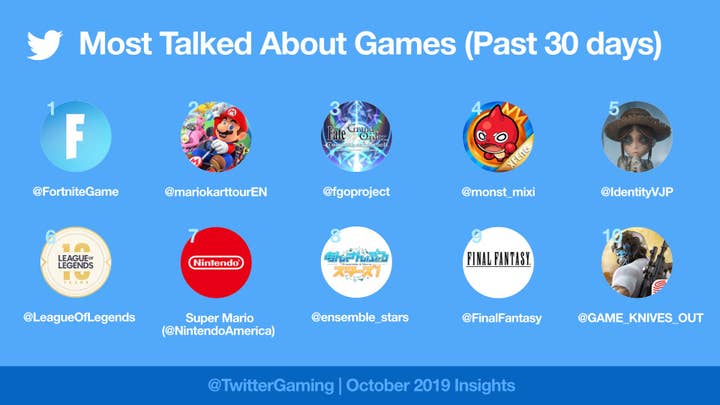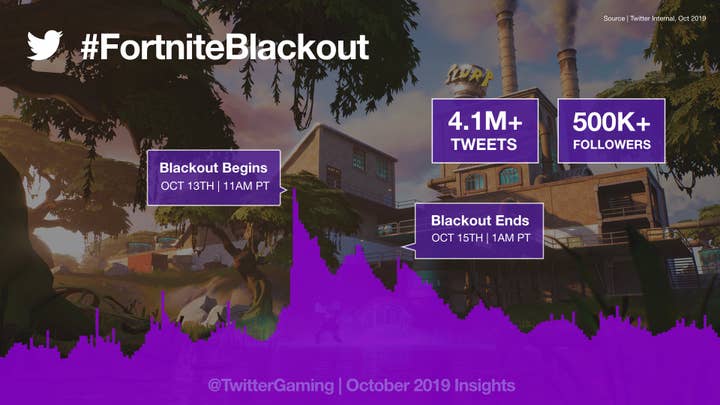What games are people talking about on Twitter?
Platform's head of gaming content Rishi Chadha discusses what sparks conversation and how it differs from region to region
For a few years now, Twitter has been tracking the games being discussed on its platform and sharing some snippets of them in E3 and year-end recap forms.
Those dips into data proved popular enough with gamers that Twitter head of gaming Rishi Chadha tells GamesIndustry.biz the company started compiling them on a monthly basis and releasing snippets of information from them earlier this year.
Here's one graphic Chadha posted covering the most talked about games on Twitter worldwide from late October:

Separate from Chadha's publicly posted excerpts, Twitter also provided GamesIndustry.biz with lists of the five most discussed gaming franchises on Twitter for five different regions from October.
Brazil
- League of Legends
- Fortnite
- Minecraft
- Grand Theft Auto
- Call of Duty
Canada
- Fortnite
- Fire Emblem
- League of Legends
- Call of Duty
- Grand Theft Auto
Japan
- Monster Strike
- Fate/Grand Order
- Ensemble Stars
- Identity V
- Kantai Collection
UK
- Fortnite
- FIFA
- Call of Duty
- League of Legends
- On Air!
US
- Fortnite
- Call of Duty
- Super Mario
- Fire Emblem
- Overwatch
"Gaming is a global phenomenon, but it's worth recognizing that people play different games in different regions," Chadha says.
He likens it to traditional sports, where football is a major sport around the world but not so much in the United States, while American football is nearly the opposite.
Twitter's charts show that many of the industry's biggest hits have wide appeal and are well-appreciated around the world.
"Fortnite is number one or two on many of these lists, except for Japan, and that speaks to the ubiquity of the game," Chadha says. "It's available on multiple platforms so you can play it on anything and the accessibility is truly there too."
And while Japan may look out of place here with its bevy of mobile titles in the chart, that's in part because it was the only Asian market included in the snapshot Twitter provided. Chadha said mobile titles are more likely to dominate the conversation on Twitter in Asian countries where consoles are less common. As for why they would be so regularly talked about in Japan -- the country that tweeted most about gaming last year -- Chadha said the games on the chart engage with their audiences differently.
"You can watch people play Fortnite, Call of Duty, or League of Legends, and you're consuming content of them playing. But people aren't necessarily doing that with mobile games yet"
"One of the things we noticed about Fate/Grand Order is they really incentivize their audience to share and talk about their game," Chadha says. "So people are sharing screenshots of them playing the game, different achievements they've unlocked... A lot of that stuff is happening almost exclusively with that game, and in turn, the game is rewarding individuals for doing that."
As for why there aren't more primarily mobile games on the Western markets' charts, Chadha has some theories.
"Right now as it stands, people aren't necessarily consuming mobile games content," he says. "You can watch people play Fortnite, Call of Duty, or League of Legends, and you're consuming content of them playing. But people aren't necessarily doing that with mobile games yet. Part of it's because it's hard to capture that content -- it's getting easier, but it's something that's still a bit harder [on mobile] -- and it's still a newer frontier when it comes to creating content around mobile games, and I think that [content] lends itself to conversation."
Other factors he mentions as contributing to the PC/console skew of the Western markets include Western gamers playing more on those platforms than mobile, and a relatively nascent mobile esports scene in the West that isn't driving discussion the way its PC and console counterparts do.
Another thing Chadha says should be considered is the tenure of these chart toppers. For example, Chadha says Call of Duty has shown staying power and Monster Strike, Fate/Grand Order, and Ensemble Stars haven't really budged from the Japanese list since they've been tracking it.
Others tend to "pop" from time to time when there's a clear driver for online discussion, like game releases or marketing beats. Fortnite in particular benefited last month from its blackout tease for Fortnite Chapter 2, while Chadha says League of Legends sparked more discussion than usual thanks to the 2019 World Championships, which ran throughout the month.

Usually it's easy to pinpoint the reason for such surges. Sometimes, as with the anime mobile game about aspiring voice actors On Air! ranking fifth on the UK chart, the reasons are less clear. Having compiled the results just prior to our discussion, Rishi says the team is still investigating what happened to spark discussion for that game. Regardless, looking at a month in isolation can warp the results anyway, as all it takes is one or two days of fevered online discussion to skew the overall results. (Interestingly though, Twitter's tracking tools did not place Hearthstone in these top five charts despite the month's much-discussed ban of pro player Chung "Blitzchung" Ng Wai for his support of Hong Kong protesters.)
"The internet moves obviously very quickly and so does the games industry, so new things are popping up consistently"
"The internet moves obviously very quickly and so does the games industry, so new things are popping up consistently," Chadha says. "I think it's about how much relevancy you can maintain, how much you're able to showcase something new or sustain what you're talking about over extended periods of time."
While there's loads of overlap between the most talked about games and the most successful ones, Chadha says the company has yet to seriously research how tight a correlation there is between being generating discussion and generating revenues.
"Admittedly it's a bit of a moving target," he says. "Just because people are talking about stuff, I don't necessarily think people are buying into it or driving revenue for that just yet, especially because some of these things are taking place around events, and not necessarily transactional events."
That's not to say there isn't useful information for developers to glean from such figures. Chadha says there's much to infer from identifying which games in each genre are generating fandom, or figuring how titles establish and maintain their relevancy. Finally, understanding how those tactics need to be adapted by market can be key.
"Get that understanding of the regional fandom, because if they have a global strategy, they're going to need to be thinking about what they're going to do for different markets," Chadha says. "The plan for what to do in Canada for example, will be very different from what they do in Japan. Understanding those trends at a regional level is going to be important."








